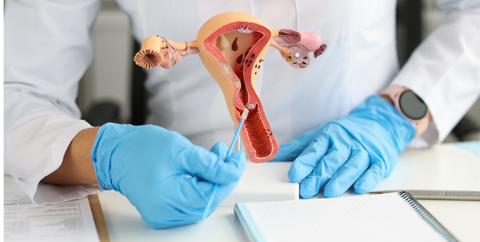It's Gynecologic Cancer Awareness Month
09 September, 2013
 Ladies, it’s time to listen up. Pink ribbons and breasts come next month, but September is the time to think about the other cancers that all women are at risk for: gynecologic cancers. September is Gynecologic Cancer Awareness Month, drawing attention to cancers that start within a woman's reproductive organs and including cervical, ovarian, uterine, vaginal, and vulvar.
Ladies, it’s time to listen up. Pink ribbons and breasts come next month, but September is the time to think about the other cancers that all women are at risk for: gynecologic cancers. September is Gynecologic Cancer Awareness Month, drawing attention to cancers that start within a woman's reproductive organs and including cervical, ovarian, uterine, vaginal, and vulvar.
Symptoms
Of these five types of cancer, screening is only possible with cervical cancer via the Pap test. In addition, the uniqueness of each type of gynecologic cancer means that women must pay attention to their bodies so they can recognize the various warning signs and symptoms. The CDC’s guidelines recommend visiting a doctor right away if you experience unusual vaginal bleeding. Other symptoms include pelvic pain or pressure, abdominal or back pain, bloating, changes in bathroom habits, or itching, burning, discoloration, rash, sores or warts of the vulva. The CDC recommends visiting a doctor if any of these symptoms last two weeks or longer. For a symptoms guide, click here.
Screening
The Pap test is effective for finding cervical cancer early including finding pre-cancers, but is not a screening method for ovarian, uterine, vaginal or vulvar cancers. The CDC recommends women start getting the Pap test at age 21 and continue through age 65. Your doctor can recommend the frequency of screening that’s right for you.
Some women, beginning at age 30, may also opt to get an HPV test which looks for HPV infection. HPV is a common sexually transmitted infection that can cause some gynecologic cancers. The test can be performed at the same time as the Pap test.
More information on screening is available from the CDC. For those who are un-insured or under-insured, cervical cancer screening may be available through the Women’s Health Connection Breast and Cervical Cancer Early Detection Program.
Prevention
The CDC notes that the HPV vaccine (Cervarix or Gardasil) offers the best protection to girls and boys who receive all three shots in the series. The CDC recommendation is that the vaccine be administered to preteen youth ages 11 or 12, to teens who have not yet receive it, or to young women up to 26 and young men up to 21. More details are on the CDC website.
If you have questions about gynecologic cancer, your risk factors, or your overall health, talk to your doctor.
(photo credit: ruurmo via photopin cc)
You May Also Like

A new option for cervical cancer screening: What at-home self-collection means for Nevada
12.22.2025
Cervical cancer screening in the U.S.

A new option for cervical cancer screening: What at-home self-collection means for Nevada
12.22.2025
Cervical cancer screening in the U.S.

2026 Cervical Health Month Resources
11.25.2025
Cervical Health Month 2026 offers an opportunity for Nevada’s healthcare and public health professionals to refocus attention on evidence-based pr